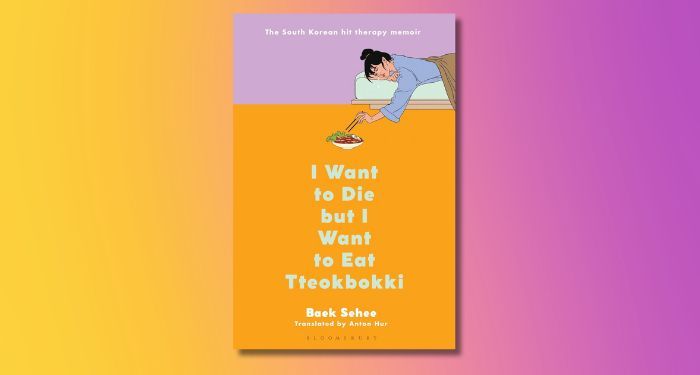
I WANT TO DIE BUT I WANT TO EAT TTEOKBOKKI
As someone with a family history of mental illness, I can’t remember a time when my family hasn’t been discussing mental health in one way or another. But my family is the exception, not the rule. The stigma around mental illness still plagues most countries around the world. To get a little more insight into different people’s experiences around mental health, I’ve been on the lookout for more memoirs about the topic. So when I first heard about I Want to Die But I Want to Eat Tteokbokki by Baek Sehee, translated from the original Korean by Anton Hur, I knew I had to get my hands on it.
Baek Sehee has the perfect life. At least, that’s what it looks like to everyone else. She works as a social media manager at a publishing house. She has a partner and some adorable dogs. But she starts seeing a psychiatrist for this constant dull feeling she’s not sure what to call. She feels hopeless, gripped by anxiety, and is incredibly judgmental of others. Eventually, her psychiatrist diagnosed her with dysthymia, or persistent depressive disorder, which is a chronic, “light” depression.
Her memoir is made up of transcripts of her therapy session. You see their conversations right on the page. There, Baek Sehee expresses her hopes and fears, her judgments of others and the feeling of being judged. She feels like such a useless mess, unsure of how to move forward. Her psychiatrist walks her through anxiety-inducing situations and gently encourages Baek Sehee to examine her own prejudices and constant presumptions of the worst in people.
Chapters are structured around different ideas that Baek Sehee is mulling over in her sessions with her psychiatrist. In one chapter, she discusses her low self-esteem, while another centers around finding the right medication and dosage to help manage her depression and anxiety. At the end of each chapter, there’s a little section where she discusses what she’s learned, ruminating over what her psychiatrist has said and how she might change her thought patterns for the future.
I Want to Die But I Want to Eat Tteokbokki is an intimate examination of the deep impact that mental health can have on one’s life. Baek Sehee shares the ups and downs of her treatment. Some days she feels encouraged by her progress, but other days, she feels like her depression and anxiety are growing worse. The last chapter is a sort of epilogue which is titled “Postscript: Reflections on Life Following Therapy.” At first, this feels like it’s going to be wrapping up the story in a neat bow. But instead, it’s more of an open-ended hope that she will continue to get better.
In I Want to Die But I Still Want to Eat Tteokbokki, Baek Sehee continues her story, sharing even more transcripts and reflections on her therapy sessions. But this time, Baek Sehee is much more obviously not well. She contemplates self-harm and death by suicide to the point her psychiatrist recommends checking herself into a mental health facility. But the facility tells her to go home and that they believe she will recover better there.
Back in her psychiatrist’s office, they’re no longer discussing “light” depression. Instead, they are delving into the core reasons why Baek Sehee is depressed. They are creating care plans and adjusting medication to try to get her the help she needs. After her low point, Baek Sehee’s darkest moments, she begins to take her mental health more seriously. She has begun to believe that her life is worth fighting for. She no longer views her depression as “light”; she understands herself as intensely depressed for the first time.
I read both of Baek Sehee’s books back to back, and from my perspective, they’re two parts of a whole. To fully understand Baek Sehee’s reckoning with her mental health, you have to read both memoirs. After I Want to Die But I Want to Eat Tteokbokki, Baek Sehee frames her brush with mental illness like the worst is over. But at the end of I Want to Die But I Still Want to Eat Tteokbokki, she better understands that her experiences with mental illness will be ongoing. She’s much more honest with herself, but still so incredibly hopeful for a better tomorrow.
You can find me over on my substack Winchester Ave, over on Instagram @kdwinchester, on TikTok @kendrawinchester, or on my podcast Read Appalachia. As always, feel free to drop me a line at kendra.d.winchester@gmail.com. For even MORE bookish content, you can find my articles over on Book Riot.











